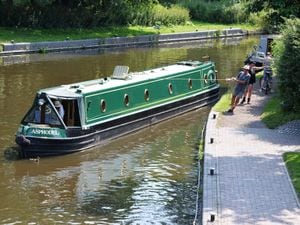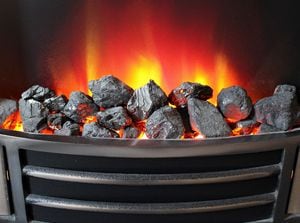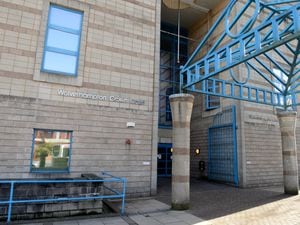Calls for better understanding of rules around smoke control areas
The leading association for itinerant people living on waterways has said new orders around smoke control may cause problems for people just trying to heat their boats.

The National Bargee Travellers Association (NBTA), which represents thousands of itinerant people living on Britain’s waterways, said that smoke control orders under the 2021 Environment Act being extended to boats were ambiguous and could cause issues for people living on boats and using solid fuel stoves to heat their boats.
Under the act, council enforcement officers can issue on-the-spot fines of up to £300 for the emission of visible smoke over a long period of time.
In the region, Sandwell Council are the only council so far to have approved plans to enforce smoke controls along its 41 miles of canal, with Cannock Chase District Council among a number of other councils also planning to enact plans for smoke controls.
The NBTA said most boaters did not have an alternative way of heating their boats, unlike almost all residential homeowners with wood-burning stoves and chair Pamela Smith argued that any air pollution caused by boat dwellers was a drop in the ocean and said the new controls would cause poorer boaters a greater number of issues.
She said: "Any air pollution caused by the estimated 50,000-70,000 boat dwellers is minimal compared to the overall level of carbon emissions in the UK.
"However, boaters are more aware than anyone of the impact of air pollution, and the importance of efforts to deal with it.
"But in the case of smoke control orders being extended to boats, many of us, particularly itinerant boaters who move in and out of these areas, are concerned that ambiguity in the legislation and in its application could lead to serious issues, not least because for the vast majority of boats, solid fuel stoves are the only form of heating."
She also argued that people might be forced into not heating their homes at all and, due to their itinerant status, would not be eligible for financial aid, as well saying that the ambiguous criteria might lead a vocal minority to cause problems for boaters.
She said: "Poorer boaters (some of whom have no option but to heat their home with foraged or donated wood) will be criminalised merely for surviving or forced into the dangerous situation of not heating their homes at all.
"It's a situation made even more unfair by the fact that itinerant boaters are not eligible for the financial aid which helps those living on land to transition to DEFRA approved stoves which they can use to burn wood lawfully.
"Other boaters may not even know that they have entered an area with an order in force, incurring fines in contravention of natural justice.

"Perhaps most worryingly, because the application of these orders relies on complaints being raised by local residents and is judged on ambiguous criteria such as ‘a significant quantity of smoke from a chimney’, there is a risk that a small but vocal minority of local residents who are hostile to itinerant boaters will use the orders vexatiously, resulting in boaters being harassed, fined or moved on from areas in which they normally live.
"These are just a few of the reasons that the NBTA encourages any local authorities considering extending smoke control orders to boats to abide by DEFRA guidance and engage our organisation and others in a genuine consultation in order to figure out just and practical ways of managing air pollution.”
In response,Sandwell Council said the smoke control order was to deal with the issue of air pollution in Sandwell and said it wasn't targeting one group, but rather anyone emitting high levels of air pollution.
A spokesman for Sandwell Council said: “Air pollution is a significant issue in Sandwell and some of the most harmful man-made air pollutants are emitted from wood and coal burning stoves which is why we are introducing a borough-wide Smoke Control Area.
“This does not ban domestic solid fuel burning, but it will require residents to take responsibility over the fuels they burn and to consider using exempt appliances. This will contribute towards improving the overall health and resilience of our communities.
“All neighbourhoods in Sandwell would be afforded the same level of protection from the potentially harmful emissions created by the burning of solid fuels in domestic properties and businesses.
“Sandwell has a number of initiatives to help all residents, including those living on boats, with the cost of living crisis. These are in addition to the specific Government initiatives to assist them.”
Cannock Chase Council’s Cabinet has approved plans to introduce a district-wide Smoke Control Order.
Between 1988 and 1998, the Council made 15 Smoke Control Orders. In total, these cover the entire district. However, many of the defined boundaries no longer exist or are otherwise unclear. The proposed new Smoke Control Order will remedy these issues, as the entire district of Cannock Chase will be covered by one Order.
The Order will, for the first time, bring moored narrowboats within scope for smoke control but does not impose any new or additional requirements in respect of fuels burned or appliances used in domestic households, commercial or industrial buildings.
Councillor Andrea Muckley, Portfolio Leader for Environment and Climate Change said: “We know households burning coal or wood in closed stoves or using log burners and open fires are a major source of particulate matter in the district.
"This council has declared a climate emergency and the updating of our smoke controls will help towards making the air our residents breath cleaner as well as helping us towards our ambition of making our district more environmentally friendly".
The Canal & River Trust also explain the new act and detailed what requirements were in place by local authorities to consult with stakeholders like boaters and said it would work to provide boaters with help and advice.
A spokesman for the Canal & River Trust said: “The Environment Act 2021 clarified that local authorities can take enforcement action against boats that breach smoke control orders.
"Local authorities are required to consult stakeholders, including boaters, before they set up new Smoke Control Zones and the Trust will continue to advocate for the needs of boaters to be taken into consideration.
“We advise all boaters in urban areas, whether it's a small town or large city, to only purchase and burn fuels approved for use in smokeless zones.
"Rubbish and treated woods should never be burnt: not only is it bad for health, but it affects other boaters, canal-side residents, and towpath visitors.
"Burning rubbish, treated woods, damp wood and any other type of non-smokeless fuel in a Smoke Control Zone could result in a hefty fine from the local authority.
“The government’s Household Support Fund can help boaters who are struggling with the cost of fuel. The Trust’s licence support team can signpost boaters to the help available.”





